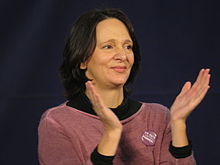
The 2016 Spanish general election was held on Sunday, 26 June 2016, to elect the 12th Cortes Generales of the Kingdom of Spain. All 350 seats in the Congress of Deputies were up for election, as well as 208 of 266 seats in the Senate.

The 2015 Spanish general election was held on Sunday, 20 December 2015, to elect the 11th Cortes Generales of the Kingdom of Spain. All 350 seats in the Congress of Deputies were up for election, as well as 208 of 266 seats in the Senate. At exactly four years and one month since the previous general election, this remains the longest timespan between two general elections since the Spanish transition to democracy, and the only time in Spain a general election has been held on the latest possible date allowed under law.
Podemos is a left-wing to far-left political party in Spain. Founded in January 2014 by the political scientist Pablo Iglesias Turrión as part of the anti-austerity movement in Spain, the party is currently led by Secretary-general Ione Belarra.
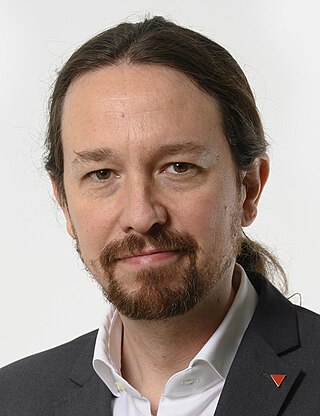
Pablo Iglesias Turrión is a Spanish political scientist and former politician. During his political career, he served as Second Deputy Prime Minister and as Minister of Social Rights and 2030 Agenda of the Government of Spain from 2020 to 2021. He also served as Member of the Congress of Deputies from 2016 to 2021, representing Madrid. Iglesias is a co-founder of Podemos, a left-wing political party that he led from 2014 until his resignation in 2021.

The 2014 Extraordinary Federal Congress of the Spanish Socialist Workers' Party was held in Madrid from 26 to 27 July 2014, to renovate the governing bodies of the Spanish Socialist Workers' Party (PSOE) and establish the party's main lines of action and strategy for the next leadership term. A primary election to elect the new party secretary-general was held on 13 July. The congress was called by outgoing PSOE leader Alfredo Pérez Rubalcaba after his party's poor results at the 2014 European Parliament election, garnering just 23% of the vote. Rubalcaba announced his intention not to run for either his party's leadership or for the 2015 Spanish general election.

Susana Díaz Pacheco is a Spanish politician from Andalusia and a leading figure in the Spanish Socialist Workers' Party (PSOE) as the former leader of the Andalusian PSOE-A.

Juan Carlos Monedero Fernández-Gala is a Spanish political scientist and writer. He is a professor at the Complutense University of Madrid and a host of La Tuerka. He was one of the leading members of Podemos until he resigned in April 2015.

Íñigo Errejón Galván is a Spanish political scientist and former politician.
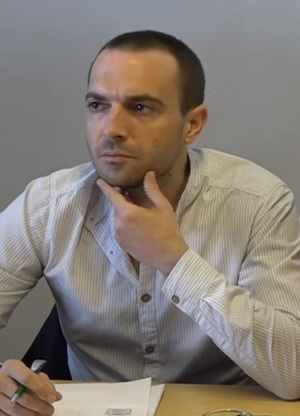
Luis Alegre Zahonero is a Spanish philosopher and writer, a professor in the Complutense University of Madrid, and a founding member of Podemos.
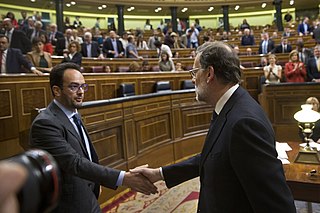
Attempts to form a government in Spain followed the inconclusive Spanish general election of 20 December 2015, which failed to deliver an overall majority for any political party. As a result, the previous People's Party (PP) cabinet headed by Mariano Rajoy was forced to remain in a caretaker capacity until the election of a new government.
Unidas Podemos, formerly called Unidos Podemos and also known in English as United We Can, was a democratic socialist electoral alliance formed by Podemos, United Left, and other left-wing to far-left parties in May to contest the 2016 Spanish general election. The alliance's official pre-agreement was announced on 9 May 2016 after weeks of negotiations. It was re-styled to the feminine form of its name ahead of the April 2019 Spanish general election.

The 39th Federal Congress of the Spanish Socialist Workers' Party was held in Madrid between 16 and 18 June 2017, to elect a new party leadership in the Spanish Socialist Workers' Party (PSOE) and set out the party's main lines of action and strategy, after the sacking of Pedro Sánchez as party leader in October 2016 had resulted in a caretaker leadership being appointed. The primary election was held on 21 May 2017, after being confirmed in a federal committee on 1 April.

A motion of no confidence in the Spanish government of Mariano Rajoy was debated and voted in the Congress of Deputies between 13 and 14 June 2017. It was brought by Unidos Podemos leader Pablo Iglesias as a result of a corruption case involving high-ranking People's Party (PP) officials, amid accusations of maneuvers from the Rajoy government to influence the judicial system in order to cover-up the scandal. This was the third vote of no confidence held in Spain since the country's transition to democracy—after the unsuccessful 1980 and 1987 ones—as well as the first not to be registered by the main opposition party at the time.

Más Madrid is a progressive regional political party in Spain. Its primary strength is located in the city of Madrid. It advocates for participatory democracy and promotes green politics, having cooperated with like-minded parties such as the Greens Equo and European Green Party members. It sits on the left wing of the political spectrum.
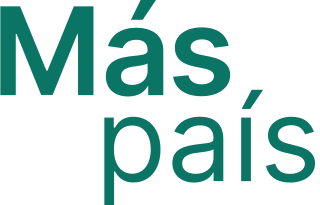
Más País (MP), or More Country, was a political party in Spain. It was an electoral platform formed by Íñigo Errejón around Más Madrid in order to contest the November 2019 general election.

Dina Bousselham is a Moroccan political advisor, candidate, and political scientist affiliated with the Spanish political party Podemos, and the director of the online newspaper La Última Hora! As a political science student at the Complutense University of Madrid she took classes with Pablo Iglesias Turrión, who was a lecturer there. When Iglesias founded Podemos in 2014 and won election as a Member of the European Parliament, he chose Bousselham as the head of his cabinet of advisors. Bousselham was later named as a manager of the Podemos party apparatus in Madrid, and she was chosen in a primary election as a Podemos candidate for the regional citizens council in 2019. However, after her application for Spanish citizenship was denied, she was not able to contest the general election. In 2020, she left Podemos to head the digital news service La Última Hora!

Edurne Uriarte Bengoechea is a Spanish politician, political scientist, and sociologist. She is a member of the Spanish Congress of Deputies for the People's Party of Spain, representing The Constituency of Madrid.

Ione Belarra Urteaga is a Spanish politician and psychologist from Podemos who served as minister of Social Rights and 2030 Agenda from 2021 to 2023. She has been her party's leader since June 2021.
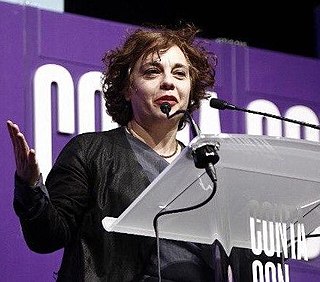
María Gloria Elizo Serrano is a Spanish lawyer, politician of Podemos and the third vice president of the Congress of Deputies. Since 18 February 2017 she has been part of the national executive of We Can in different responsibilities and since 8 June 2019 as Secretary of Democratic Regeneration and Policies against Corruption.

Attempts to form a government in Spain followed the Spanish general election of 28 April 2019, which failed to deliver an overall majority for any political party. As a result, the previous cabinet headed by Pedro Sánchez was forced to remain in a caretaker capacity until the election of a new government.
